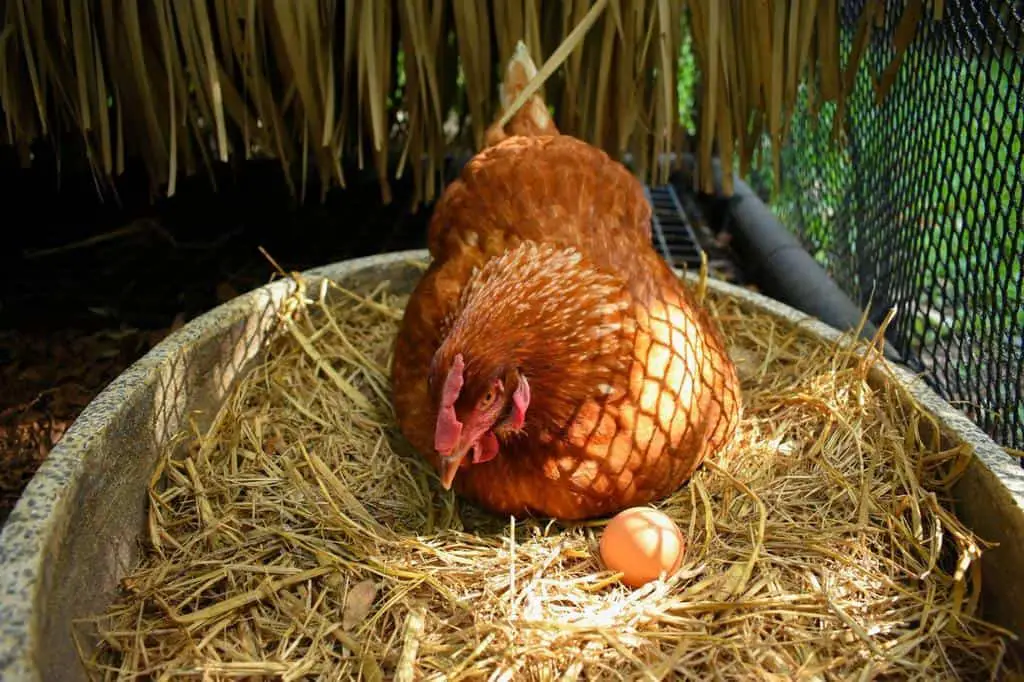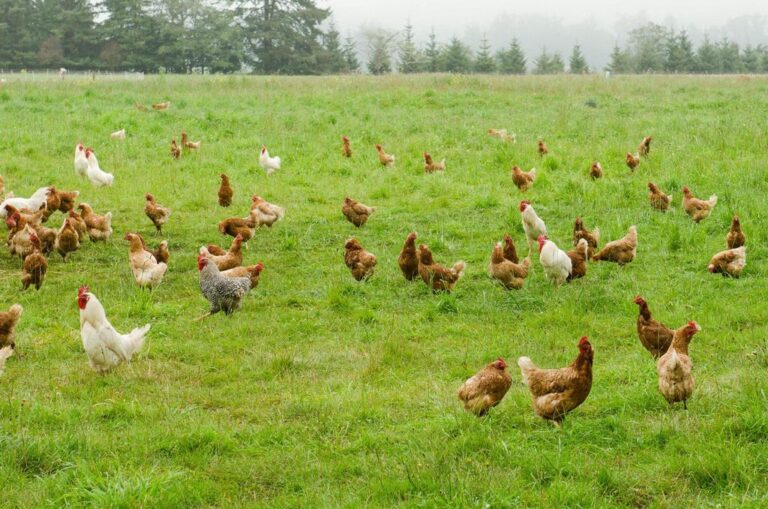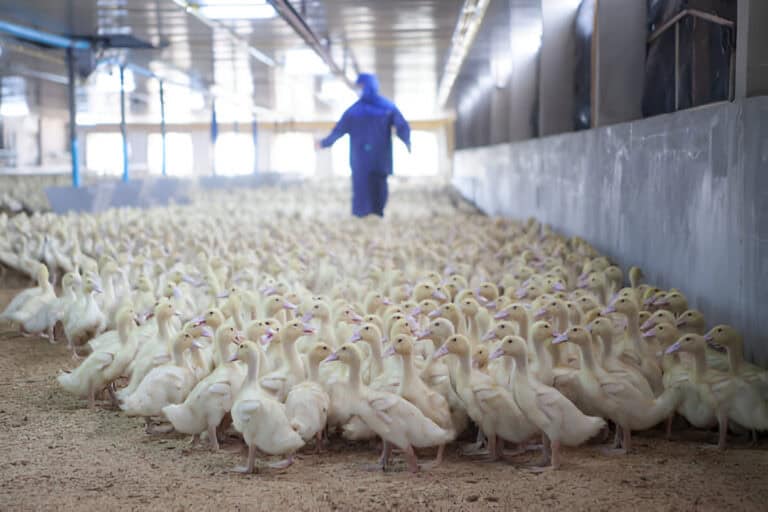Will Free Range Chickens Lay Eggs in the Coop? Do They Lay More Outside?

If you’re wondering why your free-range chickens won’t lay eggs in the coop or why they lay more eggs outside of it, this article is here to explain.
Come with us as we learn about the complicated relationship between free-range chickens and how they lay eggs, and how to get them to lay eggs in the coop. With the right plans and knowledge, you can make the process of laying eggs as efficient as possible and get fresh, healthy eggs from your own backyard.
So read on to find out all you need to know about keeping your flock happy and healthy!
Do Free Range Chickens Lay Eggs Everywhere?
Free-range chickens are able to move around freely and forage for food, which means that they are not confined to a specific area or cage. Free-range chickens do not, however, always lay their eggs anywhere and everywhere.
Chickens tend to have a specific area where they feel safe and secure to lay their eggs, which is known as a “nest.” These nests can be provided by the farmer, or the chickens can find their own. It is common for chickens to lay their eggs in a quiet, dark, and protected area. This can be in a nest box or any other suitable location that they have found.
While free-range chickens may have more options for where to lay their eggs than confined chickens, they still tend to have a preferred nesting spot. A farmer should provide nest boxes in the coop or other secure areas for chickens to lay their eggs to encourage them to do so.
Will Free Range Chickens Lay Eggs in the Coop?
It depends on the individual chickens and their preferences. Some free-range chickens may choose to lay their eggs in the nest boxes provided inside the coop, while others may prefer to lay their eggs outside in natural or man-made nests.
The way free-range chickens behave when it comes to nesting is based on their natural instincts and the way they are raised. Chickens need a comfortable, private place to lay their eggs. The coop should have enough space and nesting boxes for the number of chickens. If there are too many chickens in the coop or not enough nesting boxes, the chickens may not feel safe enough to lay eggs there. Additionally, the coop should provide proper lighting, temperature, and ventilation to optimize egg-laying.
If the chickens have access to the outdoors, they may prefer to lay their eggs in natural or man-made nests. Free range chickens are able to forage for food and engage in natural behaviors, such as nesting, which can lead to a more natural egg-laying process.
The egg-laying habits of free range chickens can be affected by other factors such as nutrition, health, and stress. Egg-laying habits can be improved with good food, veterinary care, and a comfortable place to live.
Do Free Range Chickens Lay More Eggs Outside?
Whether free-range chickens lay more eggs than those kept in coops is a hotly debated subject. Free-range chickens are typically allowed to roam freely outside and have access to fresh air, sunshine, and grass. However, it is unclear whether this makes a difference in the number of eggs produced.
Research has shown that, on average, a free range chicken will produce two more eggs per week than one kept in a small cage indoors. This difference may seem small; however, it can add up quickly over time and result in an increased quantity of fresh eggs for the homesteader or backyard farmer.
How Often Do Free Range Chickens Lay Eggs?
Free-range chickens typically lay eggs at a rate of about one egg per day. However, this can vary depending on several factors, such as the age of the chicken, the breed of the chicken, and the time of year.
For example, younger chickens will typically lay fewer eggs than older chickens. Similarly, some breeds of chickens are known to lay more eggs than others. Chickens typically lay the most eggs in their first year of laying, and the number of eggs laid decreases as the chicken ages. Hens that are under a year old can lay up to
Depending on the breed of chicken, there can be a big difference in how often they lay eggs. Some breeds are known for their high egg-laying abilities, while others are not as productive. For example, breeds like the Rhode Island Red and Leghorn are known for their high egg-laying abilities, with some hens laying one egg per day. On the other hand, some breeds, like the Plymouth Rock and Orpington, are not as productive and may only lay one egg per week.
It’s worth mentioning that free-range chickens may also take a break from laying eggs, this is known as a “molt” period. During this time, the chickens will shed their feathers and regrow them, which can take several weeks. During this period, the chickens will not lay eggs.
In addition to the natural factors that can affect a free range chicken’s egg-laying rate, there are also several management practices that can be implemented to increase egg production. For example, providing chickens with a balanced diet, a clean and comfortable living environment, and protection from predators can all help to improve their egg-laying rate.
Factors That Affect Egg Laying in Free Range Chickens
1. Lighting
Lighting and temperature play a crucial role in the egg-laying habits of free range chickens. Chickens need a certain amount of daylight to lay eggs, and a lack of light can disrupt their natural egg-laying cycle.
2. Temperature
Similarly, temperature also affects chickens’ egg-laying habits. If the temperature is too hot or too cold, chickens may stop laying eggs. A chicken coop that lets in natural light and air is a good way to make sure that the chickens have the right amount of light and temperature.
3. Humidity
When examining egg production in free-range chickens, humidity is an important factor to consider. High humidity can negatively affect a chicken’s health and lead to decreased egg production.
Too much humidity can cause wet litter which increases the risk of respiratory diseases and other issues that can interfere with laying eggs. Conversely, too little humidity can cause dryness in the air which can lead to dehydrated birds and reduced egg production as well.
4. Nesting Boxes and Coop Design
Nesting boxes and coop design are also important factors that can affect egg-laying habits. When laying their eggs, chickens need a comfortable, private space. If there are too many chickens in the coop or not enough nesting boxes, the chickens may not feel comfortable enough to lay eggs. It’s essential to provide enough nesting boxes for the number of chickens, and to keep them clean and in good condition.
5. Feed and Nutrition
Feed and nutrition also play a role in free range chicken egg-laying habits. To lay eggs, chickens need a balanced diet with the vitamins and minerals they need. A lack of nutrients in their diet can lead to reduced egg production. It’s important to provide a diet that is high in protein and calcium, and to supplement with vitamins and minerals if needed.
6. Stress and Aggression
Stress and aggression can also affect egg-laying habits. Chickens that are kept in crowded or unsanitary conditions, or that are exposed to high levels of stress may stop laying eggs. It’s important to give chickens a safe and comfortable place to live, and to reduce stress and fights by keeping aggressive birds apart and giving all birds enough space.
7. Seasons
Chickens are born with the ability to lay eggs, which is affected by how much light they get. They are called “photoperiodic” animals because their reproductive cycles depend on how long it is outside. They are called “photoperiodic” animals because their reproductive cycles depend on how long it is outside.
During the shorter days of winter, there is less daylight, and chickens will lay fewer eggs. As the days become longer during the summer, they will lay more eggs. This is because when the days get longer, the chickens know it’s a good time to start mating and laying eggs.
Are Free Range Chicken Eggs Better?

When it comes to eggs, many people wonder if free range chicken eggs are better than regular eggs. The short answer is that free range eggs may be better in terms of nutrition and taste, but they also tend to be more expensive.
If you’re on a tight budget, regular eggs might be the best option for you. However, if you’re looking for a healthier and more ethical option, free range eggs are worth considering.
Studies have found that free range eggs have more nutrients than both cage-free and regular eggs. For example, free range eggs typically have higher levels of vitamin E, beta-carotene, and omega-3 fatty acids. They also have less cholesterol than regular eggs. This is because free range chickens are able to forage for food and engage in natural behaviors, which leads to a more balanced diet and healthier eggs.
Certified humane organic eggs are considered to be the best option when it comes to egg quality, taste, and nutrition. The chickens that produce organic eggs are raised on an organic diet and are not exposed to antibiotics, hormones, or pesticides. These chickens also have access to the outdoors, which allows them to engage in natural behaviors.
Comparison of Egg-laying: Free Range Chickens and Confined Chickens
| Category |
| Free Range Chickens |
| Confined Chickens |
| Egg-laying frequency | Can vary depending on breed, age, and time of year | Can vary depending on breed, age, and time of year |
| Nesting behavior | Can lay eggs in nest boxes provided inside the coop or in natural or man-made nests outside | Typically lay eggs in nest boxes provided inside the coop |
| Nutritional factors | Can forage for food, leading to a more balanced diet | Typically have a controlled diet |
| Environment | Have access to the outdoors, leading to more natural behaviors | Typically kept in small cages, with limited space and options for nesting |
| Egg quality | Studies have found that free range eggs have higher levels of vitamins, minerals and less cholesterol | Studies have found that eggs laid by confined chickens may have less nutritional value |
How To Get Free-Range Chickens Laying Eggs In A Coop
Free-range chickens are known for their ability to lay eggs in various locations, but getting them to lay eggs in a coop can be a bit of a challenge. But with a few easy steps, farmers and people who keep chickens in their backyards can get free-range chickens to lay eggs in a coop.
The first step to getting free-range chickens to lay eggs in a coop is to build trust with the birds and make them comfortable in their home base. This can be achieved by providing a safe and comfortable environment for the chickens and by interacting with them regularly.
By spending time with the chickens and getting to know their individual personalities and needs, farmers and backyard free-range chicken keepers can create a sense of trust and security for the birds.
Another important factor is to provide enough nesting boxes for the chickens. The rule of thumb is one nesting box for every four birds. Nesting boxes should be placed in a quiet, secluded area of the coop to give the chickens the privacy they need.
TIPS
Using a nest egg or fake eggs to train the chickens can also help them lay their eggs in the coop. This can be done by placing a fake egg or a nest egg in the nesting box to show the chickens where to lay their eggs.
Last but not least, keeping the chickens in the coop for a few days can help them get used to using their nest box. This can be done by locking the chickens in the coop for a few days, during which time they will learn to use the nest box and associate it with laying eggs. This method can be used as a training tool, and it can help the chickens adopt the coop as their primary laying location.
Conclusion
In conclusion, free range chickens have the ability to lay eggs in various locations, both inside and outside the coop. However, whether or not they will lay eggs in the coop depends on the individual chickens and their preferences.
Some free range chickens may choose to lay their eggs in the nest boxes provided inside the coop, while others may prefer to lay their eggs outside in natural or man-made nests.
The number of eggs laid by free range chickens can also depend on the environment and resources available to them, chickens that have more access to food, nesting places, and natural light tend to lay more eggs. It’s important to note that each chicken is unique, so it is essential to observe and adapt to the specific needs of your flock.
By providing free range chickens with the required, nesting boxes, proper lighting, temperature, and nutrition, and minimizing stress and aggression, farmers and backyard chicken keepers can encourage free range chickens to lay eggs in the coop, and also optimize their egg-laying process.





